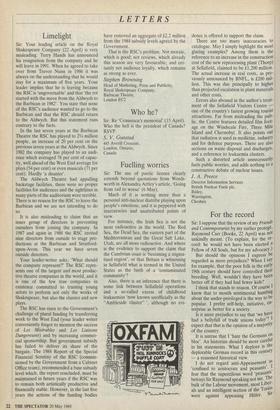LETTERS
Limelight
Sir: Your leading article on the Royal Shakespeare Company (22 April) is very misleading. Terry Hands has announced his resignation from the company and he will leave in 1991. When he agreed to take over from Trevor Nunn in 1986 it was always on the understanding that he would stay for a maximum of five years. Your leader implies that he is leaving because the RSC is `ungovernable' and that 'the rot started with the move from the Aldwych to the Barbican in 1982'. You state that none of the RSC's audience wanted to go to the Barbican and that the RSC should return to the Aldwych. But this statement runs contrary to the facts.
In the last seven years at the Barbican Theatre the RSC has played to 21/4 million people, an increase of 20 per cent on the previous seven years at the Aldwych. Since 1982 the company has played to an audi- ence which averaged 78 per cent of capac- ity, well ahead of the West End average for plays (54 per cent) or even musicals (71 per cent). Hardly `a disaster'.
The Aldwych Theatre had appalling backstage facilities, there were no proper facilities for audiences and the sightlines in many parts of the auditorium were terrible. There is no reason for the RSC to leave the Barbican and we are not intending to do so.
It is also misleading to claim that an inner group of directors is preventing outsiders from joining the company. In 1987 and again in 1988 the RSC invited nine directors from outside to stage pro- ductions at the Barbican and Stratford- upon-Avon. This year we have seven outside directors.
Your leader-writer asks, `What should the company represent?' The RSC repre- sents one of the largest and most produc- tive theatre companies in the world, and it is one of the few true companies in existence committed to training young actors to perform not only the works of Shakespeare, but also the classics and new plays.
The RSC has risen to the Government's challenge of plural funding by transferring work to the West End (your leader writer conveniently forgot to mention the success of Les MLserables and Les Liaisons Dangereuses) and by increasing commer- cial sponsorship. But government subsidy has failed to deliver its share of the bargain. The 1984 Report of the Special Financial Scrutiny of the RSC (commis- sioned by the Government from a Cabinet Office team), recommended a base subsidy level which, the report concluded, must be maintained in future years if the RSC was to remain both artistically productive and financially stable. However, in the last five years the actions of the funding bodies have removed an aggregate of £2.2 million from the 1984 subsidy levels agreed by the Government.
That is the RSC's problem. Not morale, which is good; not reviews, which already this season are very favourable; and cer- tainly not audience loyalty, which remains as strong as ever.
Stephen Browning
Head of Marketing, Press and Publicity, Royal Shakespeare Company, Barbican Theatre, London EC2


































































 Previous page
Previous page